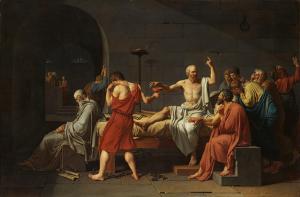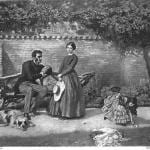
I am sometimes asked how to prepare a class, or take notes in reading. For me asking questions of the text is a start and this happens over time. What does this look like? Here are notes drawn from a Republic teaching session. Because they were started a long time ago and continued over time, I cannot be sure all of the questions are mine. A good class requires a set of questions and as his collection grows and I become unsure where the origin story of the document. When you work with bright colleagues and students, this grows ever more difficult!
Many are reacting to conversations with Professor Al Geier over decades found in my notes of the Republic. When I teach a dialogue (next week Phaedo in The College), this the kind of preparation that required for a meaningful session. If the tutor is not asking questions, challenging his own view of the text, or seeing different perspectives, then the session will drag. Much of “classical education” fails, because this process is short changed.
One of these questions listed below would likely will be the opening of a session. The vitality of a class comes from hiding the preparatory work and allowing the “practical considerations” of the students (see Book V of Republic) to steer what the conversation will be. A great book like Republic, if known well enough, will allow a shift in topics (virtue, science, metaphysics, ethics). The particulars of the discussion rarely will be the same, though the opening questions and some of the background might be for a particular tutor.
Here are some notes:
Republic
Books V and VI
Book V
449 a Do the young men conspire against Socrates? Does this derail the argument? If so, then would we really wish to lose out on Books V, VI, and VII? We care so much about those books, but does this show them to be a bit of a distraction? Or is this part of the education of the soul that is pictured at the start of Book VII?
449 a Do practical considerations “slow down” theoretical growth?
449 b Does the Eros driving the young men save them from a vision too great for their souls? What is the source of this passion? The source is unlikely merely to be a Socratic show, but something deeper. What triggers this?
449 b That Polemarchus speaks reminds us of Book I and suggest a dragging down. See Phaedrus. Where are they coming from? Where are they going in this dialogue?
449 c Has Socrates (again?) given up on the long argument? (See Book II)
450 a Thrasymachus a tamed member voting in the new city. How has this happened?
450 c Is love of argument really the measure of virtue in a young man?
451 a How can Socrates go forward in safety? Socrates will develop a new means of learning in an uncertain world.
451 b Glaucon laughs. As Geier often has said, the laughter in a dialogue is rare enough to be meaningful.
452 b Socrates points to the absurdity, but young men are not deterred by the absurd!
453 d A great sea of difficulties is to come, but a man can drown in a tea cup.
454 a Contradiction is an unsatisfactory way to “show” a proof and yet it is very powerful.
454 e Socrate defends women in philosophy. Compare J.S. Mill. Contrast with Aristotle. Why a change for the worse in Timaeus? Is “science” (as the ancients construed it) at war with justice?
456 b The marriage of equals. Compare Aristophanes in Symposium. Note end of Jane Eyre.
457 b Note: the laughing man knows nothing.
457 c A greater wave: children and property in common.
457 e Compare Swinburne’s bucket argument for theism and the “coalition of arguments here.” Can arguments gain cumulative force, even if they have possible flaws? What is the nature of persuasion to these young men who want to see and not just seem to see?
458 b “postpone” the topic of whether this is all feasible. Does it matter in a City of Words? If we not building this City (in fact), then why ever return to details?
458 c Note key words: νομοθετας and μιμουμενους
458 e Note geometry and love. How does the abstract and the passionate interact here?
460 a The creation of hymns to good marriages. What kinds of songs will be made? Are they geometric?
461 d Young men that have chased out their father act as if family relationships are the strongest bond?
462 b Should diversity actually be a goal in a good state? Isn’t unity harder to achieve? Or is that the road to tyranny? (See Book IX)
462 c How does one develop corporate feeling?
462 d Key to this book: There is a divine part of the soul. Up to this point the soul is mortal and connects to the body. We are reminded the City is an excuse to see the soul.
462 e The return to the City reminds us that the need to see the many is for the sake of the one: Glaucon.
463 b “saviours and helpers” Why this combination?
463 c The powerful or philosophic outsider is a threat to any City. How can the natural “outsider” become an “insider?”
464 d Just linked with piety. Piety? Compare to Euthyphro
464 a Pleasures and pains in common! A shared cross . . . the just man (Book I) is always crucified.
464 d One faith?
465 d Note the use of sight again. These men are happy, blessed.
467 a Compare Timaeus: there Socrates asks to see the City in action. . . only he “sees” it in words.
471 c The nadir of the dialogue?
472 a Note the impatience. The dismissal of “everything else” is very strong.
472 b We face the greatest wave: philosopher kings. Compare with Odysseus on his raft.
472 d Is the Timaeus a paradigm of this sort? Does the Timaeus a commentary to the
Republic, because the purpose of Republic is revealed: to tell a likely myth?
473 d Can one make a just man miserable and still be a just city?
473 e Socrates must fear the city after this section. Why all the speculation given this peril? Why not action? Why is even mentioning the philosopher king so dangerous?
474 c Reminder: philosophy. Socrates tries to find first the lover and only then the sophist.
476 a “base and ugly” What is the role of these two in seeing the just man?
476 e Socrates commands us to consider for ourselves. Can Glaucon think for himself at this point?
478 a What is the relationship of modern “science” to true science?
479 d Two political affirmations. Note the use of “necessarily.” A great harmony has been achieved after the waves.
480 a Not e the command to “remember.” Compare Meno. Does Alcibiades have something to contribute?
Book VI
484 a “the long winding way” What is it?
484 c Note the repetition of paradigm.
485 d What is the relationship between the lover of knowledge and the lover of wisdom? Compare to Metaphysics Book I.
487 b “And Adeimantus said:” Why now? Why is he speaking?
487 b Why draughts? Why this particular simple game?
489 a Teach this story as Timaeus style story or a fable or what kind of literature?
490 b “beget intelligence and truth” What is the relationship between the two?
492 b compare 493 a and Meno.
492 e note the “divine part.” How far can we go in calling this part of the soul divine? Is the tripartite soul complex?
493 c “the great beast” and dogma: how can truth be kept from becoming monstrous dogma in our souls?
494 b How can the nature of the body be made compatible with the nature of the soul?
494 c Check out the word for “flattery” here. Very deep term.
496 c Relate the “divine sign” to the “divine part” of the soul.
497 b This entire section is worth memorizing! There is no eternally good city in this life. What are the implications for Plato’s actual politics as opposed to those in the City of
Words?
498 c There is a new eagerness on the part of Socrates. From whence does it come?
500 d Another key passage in all of Plato. Astronomy as a cure for the body. What is the role of the stars in Plato? Can we become “like” the thing we look at?
500 d Note the possible action of the divine “craftsman.”
501 b Here is an element “almost divine.” Note “seeing” Why Homer here?
501 d If they are moderate/reasonable/a gentleman?
505 d-e Brings us back to Book II. Compare.
506 d Strong statement by Glaucon. Why would Socrates draw back? Why is Glaucon so passionate? What does he see? He speaks in the plural (“us”).
508 a Socrates challenges Glaucon: “‘The thing,’ I said, ‘you call light.'”
509 a This is a word found only in Plato . . . beauty beyond beauty. αγαθοειδη Relate beauty as a source of knowledge!
509 c “And Glaucon very ludicrously said . . . ” This may be the most important sentence in Republic (according to Al Geier). What is going on in Glaucon?
510 d Compare this “Certainly . . . ” with 509 c.
510 e What does it mean to be a “reality” in the mind?
511 d Glaucon is honest. Section deserves a full class.
511 e Geier: “high point of the dialogue.” I think not . . . because the community is still not full as it will be at the end. You decide. I think Glaucon and Socrates reach a deeper community in the “we” passage that closes Republic. Continue to think.












